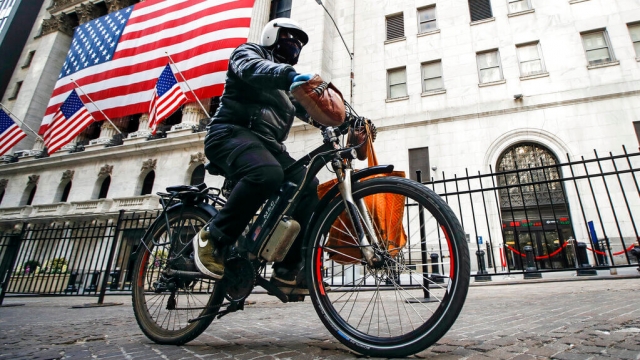You may have seen them in your neighborhood. Electric bikes, or e-bikes, offer convenient size, maneuverability, and range.
"I actually sold my car because this is so much more convenient," said fitness trainer Eve Santiago of Chicago. "If I need to get around traffic, I can easily go in the bike lane. You can park on the sidewalk; you get places so much faster."
Sales of electric bikes, or e-bikes, reached 1.3 billion dollars last year, according to a trade group. Along with electric scooters and mopeds, e-bikes are part of a growing trend called micromobility. In 2021, e-bikes made up 20% of Lyft's vehicles in New York City but forty percent of their total rides.
"Every month we're selling more and more bikes," said Asif Shakeel, owner of Strictly E-Bikes in Alexandria, VA. Shakeel used to run automotive repair shops.
Last year, he switched to selling e-bikes.
"Older folks that are now retired and they want to get back out and be active. So they're coming in here and buying two e-bikes where, as a couple, they can go and get some fresh air, be active," said Shakeel. "Parents are coming in that are buying small cargo bikes that they are using to take their kids to and from school soccer practice, buying groceries."
Shakeel says e-bikes are easy to operate and can tackle some of the challenges of riding a regular bike.
"A throttle is kind of like a gas pedal. It's a great tool to help you get started from a dead stop, especially if you stop on a hill, let's say, at a stop sign when it's time to go," said Shakeel. "The other way to engage the motor is if you put on level one and start pedaling; the motor will give you a small amount of power, and it'll be mainly your leg power. But if you want to go fast or climb a steep hill, you can put on a higher level."
SEE MORE: NYC receiving $25M for e-bike charging stations following deadly fires
While e-bikes do give riders an electric boost, studies show they still improve the health of riders by making users more active.
One study found that replacing just fifteen percent of a rider's car trips with e-bike rides slashed their carbon emissions by twelve percent.
A trade group says more than a third of micromobility trips replaced car rides last year, cutting 29 million pounds of carbon dioxide emissions and reducing traffic.
Benefits like these are why more governments are promoting e-bikes. Cities across the country are offering more than eighty incentive programs, including tax breaks, rebates, and lending programs.
One significant factor is that the costs of the lithium-ion batteries most e-bikes use have plummeted. But it's their power that can also make them dangerous.
Lithium-ion batteries are sparking fires across the country.
In New York City alone, there were 108 lithium-ion battery fires as of July, and 13 people have died.
A variety of factors cause ignition.
"It could be a defect already inside of it. It could be you dropped it or punctured it; it could be if you've tampered with it," said Lt. Caroline Rudacille with the Baltimore Fire Department. "The key thing is that you're charging these in safe places, not inside your house, not around doors or anything like that where it would block egress if one of these were to catch fire."
Officials say don't charge your e-bike battery at night. If a battery ignites, get out, call 9-11, and don't try to extinguish it.
The fire risk has even led some apartment buildings to ban e-bikes from the premises.
Switching from four wheels to two hasn't been without problems. But it's a trend that's accelerating every year.
Trending stories at Scrippsnews.com



